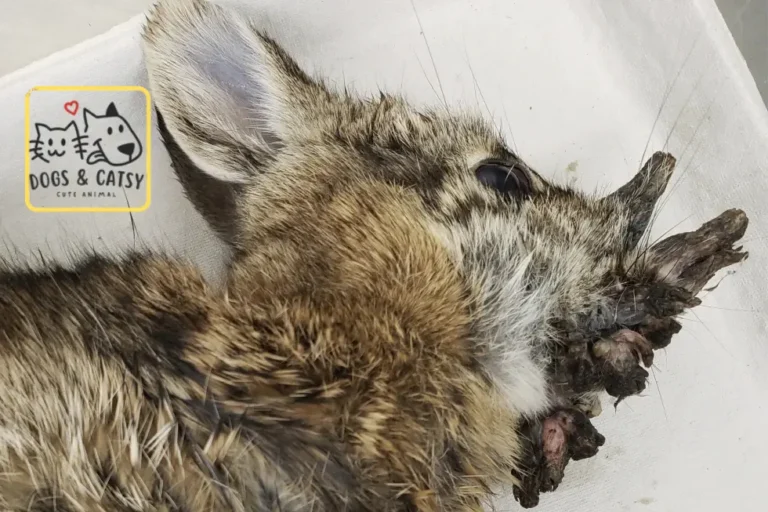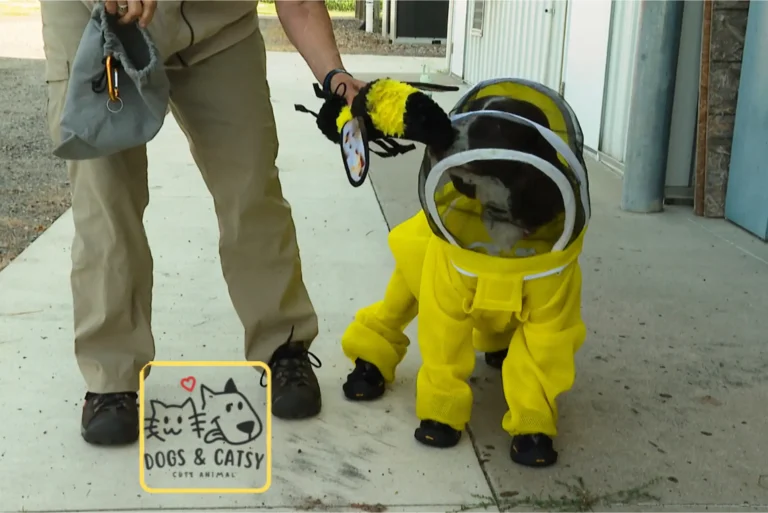Mango Worms in Dogs: Symptoms and Treatment (Vet Guide)

Mango worm infestation in dogs primarily presents as visible bumps or lesions on the skin, often accompanied by intense itching and discomfort. Infected dogs may exhibit restlessness and excessive scratching at the affected areas. Treatment involves the careful extraction of the larvae by a veterinarian, followed by thorough cleaning and application of antiseptic to prevent secondary infections. To manage the symptoms and aid recovery, vets may also prescribe anti-inflammatory medications to reduce pain and swelling. Regular grooming and avoiding exposure to infested environments are key preventive measures.
Dogs with Mango Worms
Cordylobia anthropophaga, commonly referred to as mango worms, are parasitic entities predominantly afflicting dogs in specific locales.
Originating from the sub-Saharan African region, these parasites pose significant health risks and discomfort to canines. This discussion aims to shed light on the origins, manifestations, remedial measures, and preventive strategies related to mango worm infestations in dogs.
Causes of Mangoworm Infestation
Dogs can get mango worm infestations by coming into contact with the eggs laid by flies, often through touching soil or plants that have been contaminated.
Dogs living in or visiting places where mango worms are common face a higher risk of getting these parasites. Not keeping dogs clean, not grooming them properly, and poor living conditions can also increase the chances of dogs getting infested with mango worms.
Are There MangoWorms in the United States?
Mango worm infestations are significantly less common in the United States compared to Africa. Dogs living in Africa are at a higher risk of getting mango worms than those living in other regions.
Countries like Uganda and South Africa have a higher presence of mango worms. If you reside in areas where these parasites are prevalent, there’s a greater chance your dog might get infected with mango worms.
How Do Mango Worms Infect Dogs?
Mango worms, which often reside in soil mixed with feces or urine, lay their eggs in these environments. These eggs then seek a host to inhabit, typically aiming for the skin of dogs.
Dogs have a natural inclination to play in the dirt, and it is through this behavior that they frequently come into contact with mango worms. Once the eggs hatch, the larvae penetrate the dog’s skin by burrowing, leading to discomfort and irritation.
As part of their development, the larvae consume the dog’s tissue, which results in the formation of a red boil that houses a maggot worm. When these maggots reach maturity, they exit the skin, having completed their growth cycle.
Recognizing the Symptoms of Mango Worms In Dogs
Identifying mango worm infestation in dogs is vital for prompt treatment. Several typical symptoms to watch for include:
Visible Skin Lesions
Mango worms lead to noticeable skin issues in dogs, typically seen as raised bumps or lumps on the skin. These lesions can appear red, swollen, or may even discharge fluid.
Itching and Scratching
Dogs with infestations often experience severe itching and may frequently scratch the impacted areas. They might also rub against furniture or persistently bite and lick their skin, trying to ease the irritation caused by the worms.
Swelling and Pain
As the infestation advances, swelling and discomfort may arise in the afflicted areas. Consequently, the dog may experience pain, lameness, or hesitance to move.
Secondary Infections
Open sores and wounds resulting from mango worm infestation can become infected with bacteria. This may lead to further issues such as the presence of pus, a bad smell, and heightened discomfort.
Also read: Dog Ear Piercing
Seeking Veterinary Assistance
If you notice any indications of mango worm infestation in your dog, it is essential to promptly seek veterinary care. Here’s what you should be aware of:
Recognize the Signs
Get to know the typical indicators of a mango worm infestation, including visible skin marks, itching, scratching, swelling, and signs of additional infections. Recognizing these signs quickly can aid in timely treatment.
Schedule a Veterinary Appointment
Reach out to your veterinarian and arrange for a consultation at your earliest convenience. Share the symptoms you’ve noticed and offer any pertinent details regarding your dog’s recent behavior or activities.
Professional Diagnosis
At the veterinary clinic, the vet will carry out a detailed check-up of your dog. This might include inspecting the areas that are affected, taking skin samples, or doing further tests to either confirm the presence of mango worms or eliminate other possible reasons for the symptoms.
Treatment Plan
Following the diagnosis, your vet will create a customized treatment strategy for your dog’s specific situation. They will outline the suggested treatments, possible side effects, and what you can expect from the treatment. It’s important to adhere strictly to their advice.

Professional Treatment
Based on how serious the infestation is, the vet might remove the worms by hand, give medicine to deal with any additional infections or pain, or suggest surgery for more serious situations. Only trained professionals should carry out these treatments.
Post-Treatment Care
Once treatment begins, your vet will give you guidance on how to care for your dog afterward. This could involve how to look after any wounds, how to give your dog its medicine when to come back for check-ups, or tips on how to prevent another infestation.
Follow-Up Visits
Stick to the follow-up visit schedule recommended by your veterinarian. These appointments let the vet monitor how well the treatment is working, deal with any issues, and make changes if needed. It’s crucial to finish the entire treatment plan as directed.
Communicate with the Veterinarian
Keep a line of open communication with your vet during your dog’s treatment. Tell them about any changes in your dog’s health or behavior, and don’t hesitate to ask for advice if you’re worried about anything.
It’s important to understand that getting help from a vet is key to correctly identifying and treating a mango worm infestation in dogs. A vet’s knowledge and advice are vital in making sure your dog gets the right treatment, which improves the likelihood of a good recovery.
Also read: Can a dog get a cat pregnant?
Treatment Options for Mango Worms in Dogs
In dealing with mango worm infestation in dogs, there are various effective treatments available. The selection of a treatment method is influenced by the infestation’s severity and particular conditions surrounding it.
Consulting a veterinarian for an accurate diagnosis and a tailored treatment strategy is crucial. Below are some frequently utilized treatment approaches:
Special Injections
Your veterinarian may recommend specific injections to address your dog’s mango worm infestation, which could involve administering epinephrine and lidocaine injections. These injections are effective in eliminating mango worm larvae.
Suffocating the Larvae
In this method recommended by veterinarians, they typically remove the scab from each boil and then apply a substance such as sterile wax or jelly to smother the larvae, focusing on the black dots.
Manual Extraction
In cases of mild infestation, a veterinarian might use specific instruments, such as forceps, to manually extract the mango worms. This delicate procedure should be conducted exclusively by a skilled professional to guarantee the dog’s safety and health.
Surgical Removal
For serious cases, especially where the infestation has advanced or led to complications, surgery might be required. Under anesthesia, the veterinarian will meticulously extract the worms and then offer post-operative care to aid in the healing process.
Medication
If there are secondary infections or to reduce discomfort, the veterinarian might recommend medications like antibiotics, anti-inflammatory drugs, or painkillers. These treatments are effective in fighting infections, decreasing swelling, and easing discomfort for the dog.
Wound Management
When the infestation results in open sores or wounds, managing these wounds properly is crucial. The vet may clean them, apply medicines or dressings to the surface, and give guidance on how to care for them at home to avoid additional issues.
Follow-up Care
Following the initial treatment, it’s important to have regular check-ups with the veterinarian to keep an eye on the dog’s recovery and make sure the infestation is fully cleared. The vet might suggest further treatments or preventive actions to reduce the chance of the infestation happening again.
Also read: Cytopoint killed my dog
Preventive Measures
Ensuring the prevention of mango worm infestation is crucial for maintaining your dog’s health and overall well-being. Here are some preventive measures to consider:
Maintain Regular Grooming
Create a regular grooming schedule for your dog that includes frequent brushing, bathing, and detailed checks of their fur and skin. This practice aids in the early detection of any infestation signs and supports the general health of the dog’s skin.
Keep Living Areas Clean
Make sure to frequently clean and disinfect the areas where your dog lives, including their bedding, toys, and any other spaces they often use. Regular vacuuming and using disinfectants can reduce the likelihood of parasites being present.
Avoid High-Risk Areas
If you’re in or going to places known for mango worm activity, it’s wise to steer clear of densely vegetated spots, particularly in their high season. Such locations are likely to attract the flies responsible for laying mango worm eggs.
Monitor Outdoor Activities
When you’re outside with your joyful dog, particularly in areas with a higher risk of infestation, pay careful attention to what they’re doing. Limit their exposure to places that might be infested and stop them from rolling in or digging through soil or plants where mango worm eggs might be present.
Stay Updated and Educated
Stay knowledgeable about mango worms and other parasites that could impact your dog. Remain current on preventive strategies, treatment possibilities, and local trends in infestations. Consistently seek advice and suggestions from your veterinarian.
Regular Grooming Practices
Regular grooming is key to preventing and controlling mango worm infestations in dogs. Here are some vital grooming habits to include in your regular care routine:
- Brushing
- Bathing
- Inspecting the Skin
- Trimming Nails
- Ear Cleaning
Maintaining a Clean Living Environment
Maintaining a clean and hygienic environment for your dog is crucial in preventing mango worm infestation. Here are several recommendations for keeping your dog’s living area clean:
- Regular Cleaning
- Vacuuming
- Outdoor Cleanup
- Disinfection
Dietary Considerations
Ensuring your dog has a healthy and balanced diet is essential for their overall health and can help them fend off infestations. Here are some important dietary factors to consider:
High-Quality Food
Provide your dog with nutritious, premium dog food that suits their age, size, and unique dietary requirements. A balanced diet is key to boosting their immune system, which in turn, reduces their vulnerability to parasites.

Supplements
Talk to your veterinarian about incorporating supplements into your dog’s diet. Omega-3 fatty acids, vitamins, and minerals are beneficial for maintaining healthy skin and bolstering the immune system.
Fresh Water
It’s important to always provide your dog with clean, fresh water. Proper hydration is essential for overall health and helps in maintaining healthy skin.
Avoid Raw Diets
Steer clear of giving your dog raw or undercooked meat, which could heighten the chances of parasitic infections. Make sure all food provided to them is thoroughly cooked and safe to eat.
Avoiding Infested Areas
To prevent mango worm infestation in dogs, it’s important to steer clear of areas known to be infested. Here’s what you should be aware of:
- Research Infestation Patterns
- Stay Away from High-Risk Areas
- Use Pathways and Trails
Travel Precautions
If you’re considering traveling with your dog to areas known for mango worm infestations, it’s important to take certain measures to reduce the risk:
- Consult with a Veterinarian
- Use Insect Repellents
- Keep Dogs on Leashes
- Avoid Contact with Stray Animals
Education and Awareness of Mangoworms In Dogs
Education and awareness play a critical role in preventing mango worm infestations in dogs. Here are ways you can enhance knowledge and foster understanding:
- Research and Learn
- Spread Awareness
- Talk to Your Veterinarian
- Stay Updated
FAQs
Can mango worms affect humans?
No, Mango worms mainly target animals, particularly dogs, and are not typically known to infest humans.
Are mango worms common in all regions?
No, Mango worms are most commonly found in specific areas, particularly sub-Saharan Africa. Infestations can occur if dogs visit these regions or if the worms are inadvertently moved across borders through international trade.
Can I remove mango worms myself?
Attempting to remove mango worms on your own is not recommended. Seeking the expertise of a veterinarian is crucial for their safe and efficient extraction.
Can my dog get reinfected with mango worms?
Indeed, dogs can become reinfected with mango worms if they come into contact with the eggs or larvae again. It’s important to take preventive steps to lower the chances of this happening.
Can mango worms be prevented entirely?
Although completely eradicating the risk may be difficult, adhering to preventive practices like consistent grooming, ensuring a hygienic living space, and steering clear of areas known for infestation can greatly diminish the likelihood of a mango worm infestation.
Can a dog survive mango worms?
Mango worms differ from other parasites that inhabit internal areas like the digestive system because they reside within a dog’s skin. Although mango worms are not considered life-threatening, ignoring them is not an option. An untreated infestation can severely irritate your dog’s skin, leading to significant discomfort for your pet.
How do I know if my dog has mango worms?
Skin Inspection:
When grooming your dog, meticulously examine their skin for indications of mango worm infestation, such as elevated bumps, redness, or sores. Should you observe any abnormalities, it’s crucial to seek a veterinarian’s expertise for a more thorough assessment.
What food causes worms in dogs?
Dog tapeworms (hydatid worms) or roundworms can be found on fresh produce that hasn’t been properly cleaned if it was contaminated with dog feces. Additionally, dog tapeworms can be present in the meat of intermediate host animals like sheep, beef, or pork if the meat is contaminated.
Conclusion
Mango worms can lead to considerable discomfort and health complications in dogs. By comprehending the causes, identifying the symptoms, obtaining prompt veterinary help, and applying preventive strategies, you can safeguard your beloved pet against mango worm infestation. It’s also beneficial to alleviate any anxiety your dog may feel at the vet’s office, enabling more tailored advice and recommendations.






